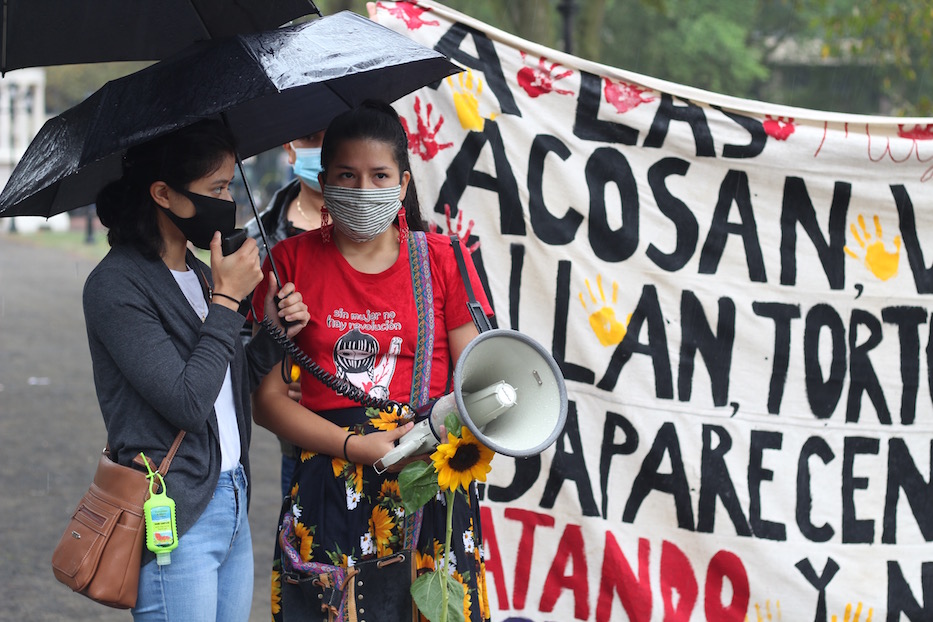
Branford | Culture & Community | New Haven Green | East Haven
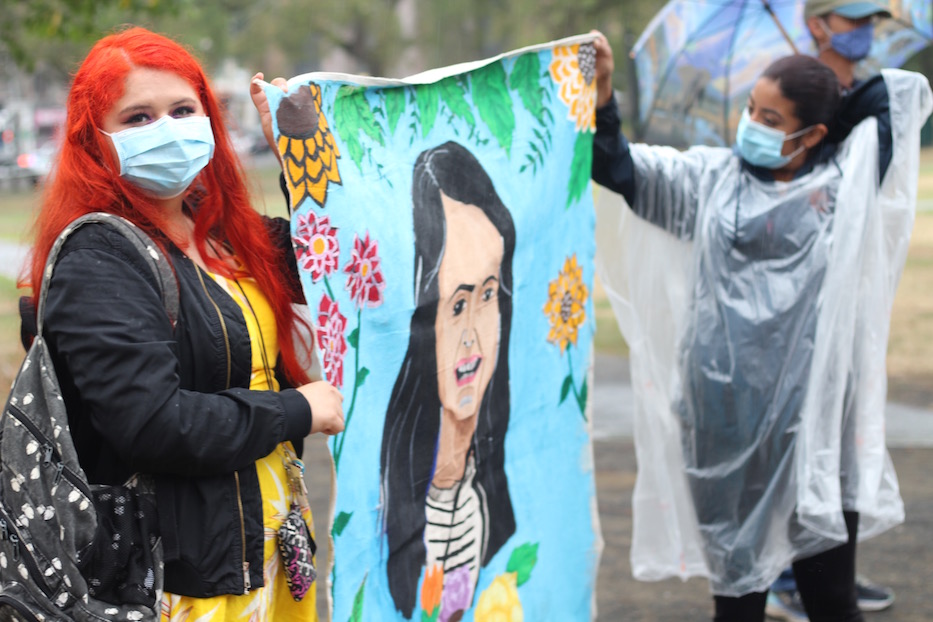
| Hazel Mencos: “I don’t think I would want to survive and live if I lost my sister.” Lucy Gellman Photos. |
Lizzbeth Alemán-Popoca could light up a room with her smile, as bright as the bursting, butter-colored sunflowers she adored. She was an artist who could fill pages with her designs, and still have hundreds more at her fingertips. She was a doting mother to her daughter Astrid, just as she had been to her younger sister Yaneth years before when the two were growing up together.
When she disappeared and was found dead last month at the age of 27, she left a gaping hole that her family and friends are still grappling to comprehend. Now, they are calling for expedited justice—and for an end to femicide and domestic violence in Connecticut and across the U.S.
That message came to the New Haven Green Sunday morning, as a car caravan, rally and vigil for the late Alemán-Popoca traveled from downtown New Haven to Fair Haven, East Haven, and Branford. It ended outside LoMonaco’s Ristorante in Branford, where her remains were discovered and identified July 16. Over a dozen attendees placed sunflowers and candles at the spot Sunday, a reclamation of the space and reminder that her life cannot be forgotten.
“They buried Lizzbeth next to a dumpster as if her life meant nothing. Nothing,” said organizer Vanesa Suarez Sunday. “As if she was trash. This is what they're doing to women in our community. Right here. What we women experience every day, in this country and throughout the world. Our sisters are being harassed, raped, we are silenced, we are tortured, we are disappeared. We are being murdered. And this is not new. We have been murdered for generations and generations. And we need to end this violence. We need to break this cycle.”

Alemán-Popoca was last seen on July 1 in East Haven, where she was living with her daughter and husband. She was reported missing on July 3. Her remains were found two weeks later in Branford and identified by the state Office of the Chief Medical Examiner.
Her father, Albino Alemán Sedeño, has set up a GoFundMe campaign to support her 7-year-old daughter Astrid. In a story reported by the New Haven Register earlier this month, Sedeño said that Alemán-Popoca was looking for a new home for herself and Astrid at the time of her disappearance.
Neither the East Haven Police Department nor the Federal Bureau of Investigation, which is also working on the case, have yet to make arrests or publicly name suspects. According to activists, neither agency has "communicated any updates or leads on the case" with the family since July 16.
Capt. Joseph Murgo, public information officer with the East Haven Police Department, said that the department has been in touch with Alemán-Popoca’s sister and father daily since July 3, when she was first reported missing. He added that the department is still waiting on a final cause of death from the Connecticut Office of Chief Medical Examiner and that the department has made “significant progress” since July 16.
“This is an extremely complex case with help from multiple agencies including the New Haven FBI and State Police Central District Major crime squad,” he wrote in an email Sunday evening. “We are confident that Lizzbeth and her family will get the justice that she and all domestic violence victims deserve but we can’t jeopardize the thoroughness of the investigation for the sake of expeditiousness.”
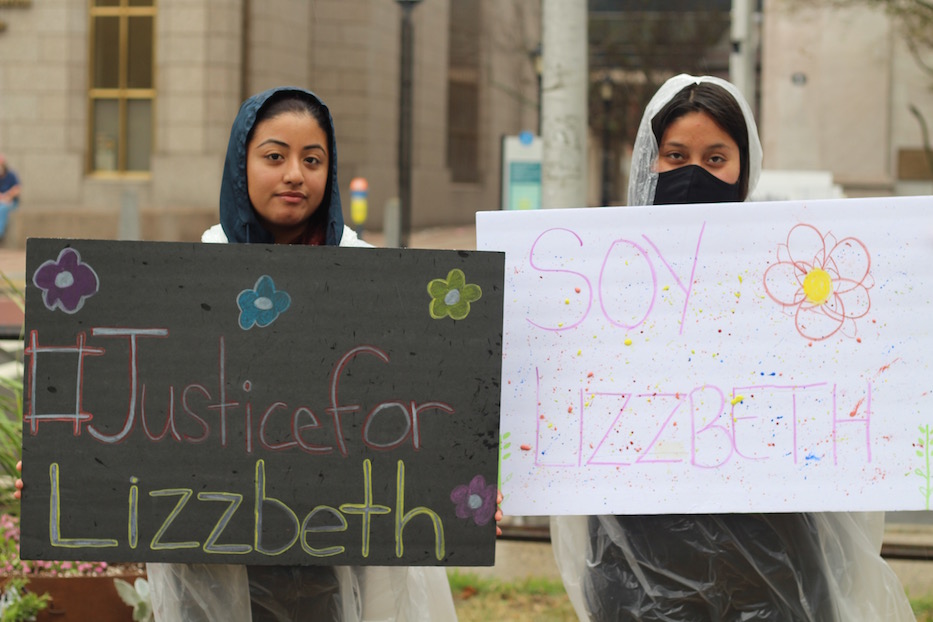
| Johana Perez and Laly Hernandez, who both read about the caravan on social media. |
Over a dozen friends, family and supporters began the day at the New Haven Green, just as a steady rain began to fall across the grass and turn the pathways into loose mud and wet gravel. Friends Johana Perez and Laly Hernandez, both of whom live in New Haven, arrived holding hand-painted signs. Dobs of yellow and blue paint smeared the poster board as raindrops quickened around them.
Perez said she first heard about the case in early July, when Alemán-Popoca was reported missing and a friend posted her picture with a notice on social media. While she did not know Alemán-Popoca, she said she wanted to show support to the family, with a deep and disturbing understanding that it could one day be her own.
“I personally think this affects the woman population, especially Hispanic women,” chimed in Hernandez, who arrived with a sign that read “Soy Lizzbeth” (I am Lizzbeth). “It’s real. In a lot of ways, you think about how it could be you. I’m a woman. I’m a mother. I’m a friend. I’m a sister.”
Just yards away, a small cluster of relatives walked from tree to tree, attaching sunflowers to each trunk. The flowers, Alemán-Popoca’s favorite for their deep yellow color, have come to symbolize the fight for justice. After her body was discovered in Branford, family members laid flowers behind the restaurant. Suarez, who helped organize the action, wore them on her skirt, where clusters of yellow and white bloomed across navy blue fabric.
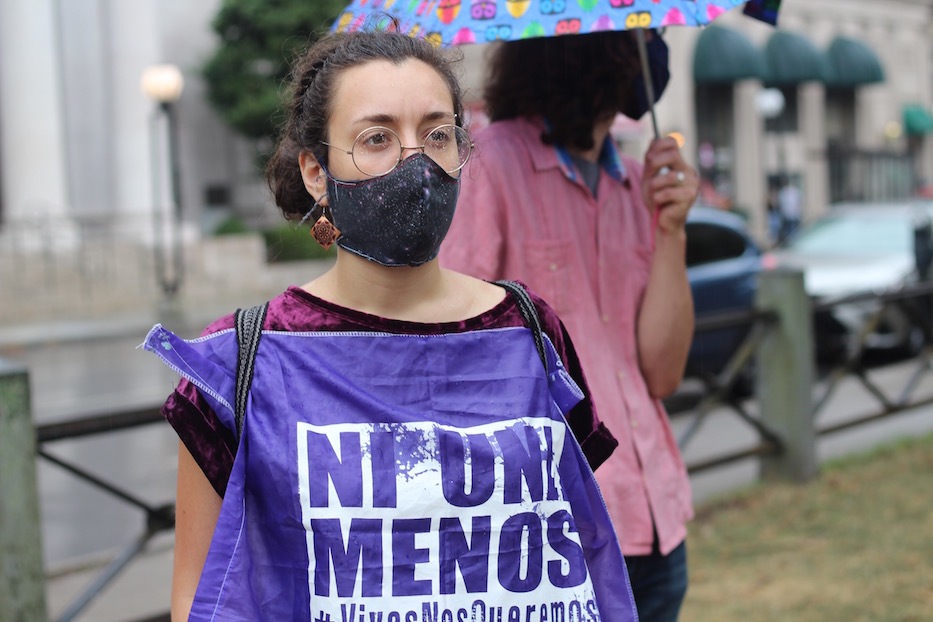
| Attendee Francesca Maviglia. "The problem of violence against women is not local," she said before the rally. "We all know the fear of walking home at night." |
“We are here so that everyone can feel her absence,” Suarez said. “We need to feel every time one of our sisters is taken. We need to feel and hold and share that pain together, so that together we can address violence against women and eradicate it.”
She gathered the crowd, which had grown to over a dozen beneath umbrellas. Around her, activists unfurled a portrait of Alemán-Popoca, painted by New Havener Héctor García. In the portrait, flowers and greenery surrounded her soft face, framed against a sky-blue background.
Six leaves swayed above her head. Sprays of red, yellow and purple petals danced around her cheeks. Her eyes sparkles; her lips parted to smile. A second banner read A las mujeres nos acosan, violan, callan, torturan, y nos desaparecen. Nos están matando y nos ignoran. Justicia para Lizzbeth (Women are harassed, raped, kept silent, tortured, and disappeared. They are killing us and ignoring us. Justice for Lizzbeth).
As the rain turned into a downpour, organizer Hazel Mencos (photographed at top) adjusted the top righthand corner of the banner, as if to keep it safe. Mencos is close friends with Alemán-Popoca’s younger sister, Yaneth Alemán, and loved both women as family.
“The story of what happened to Lizzbeth really touched me, because I also have a sister who is 27 years old, and I can’t imagine losing her,” Mencos said. “I don’t think I would want to survive and live if I lost my sister.”
"A lot of people don't even like to talk about this," she later added. "It's very taboo to talk about this in our communities. To talk about violence against women. I've even had my own family members tell me: 'Hey, don't be involved in this.' But if we are silent, then they will keep killing us. And I'd rather speak out and die trying to make a change than remain silent."
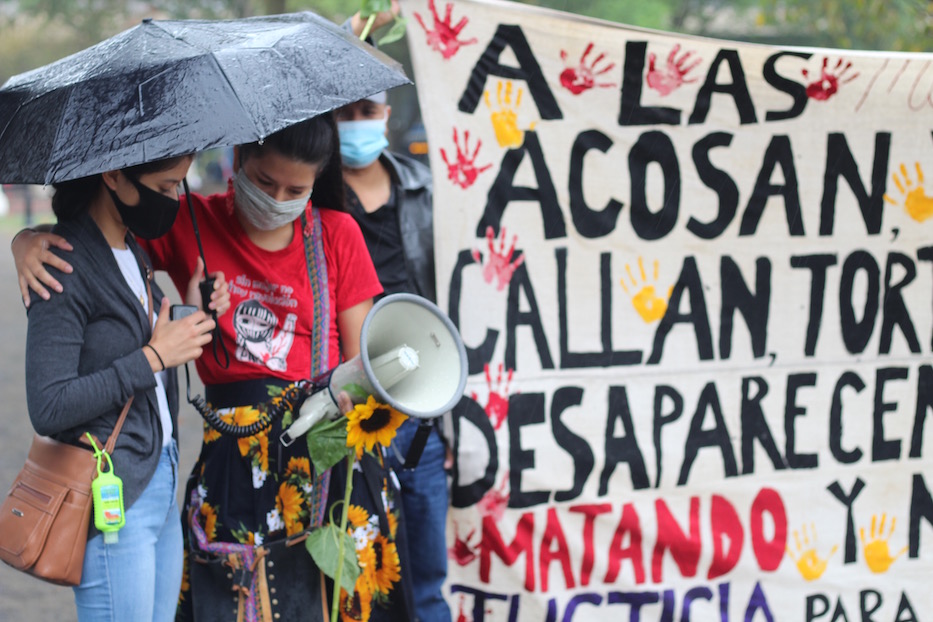
| Yaneth Alemán and Suarez. |
Alemán, who goes by the nickname Yane, spoke of the grief and frustration that she now feels each day, living in a world without her older sister. When the two were children, Alemán-Popoca watched out for her, guarding her fiercely as they were raised by their grandparents in Mexico. When Alemán was 13, she and her sister joined their father in the U.S. The two remained close, nearly joined at the hip until the devastation of last month.
“It is very hard to be here, and I don't wish this on anyone,” she said as Suarez translated from Spanish to English. “But I am here for change today. Not just for my sister, but for all women and girls. I'm here for the mothers, and all of our aunts.”
She added that she feels her sister is actively being robbed of due justice. In early July, she said her sister’s husband lied to the family about Alemán-Popoca’s whereabouts, saying that she had run away to Mexico. Alemán pushed back: she had found out that her sister’s car was still in East Haven, as were all of her belongings. She is currently caring for her niece.
Fabiola Mendieta-Cuapio, who had made the journey from New York, recalled meeting Alemán-Popoca when she was 16, and had just arrived in the United States with her younger sister at her side. She could tell almost immediately that the teenager, who seemed like both an adult and just a kid, had big dreams. She wanted to see her achieve all of them.
“She was full of life,” she said. “I know she was really smart. I know she loved her daughter. She would never, ever run away. There's so much we have to do in Connecticut.”
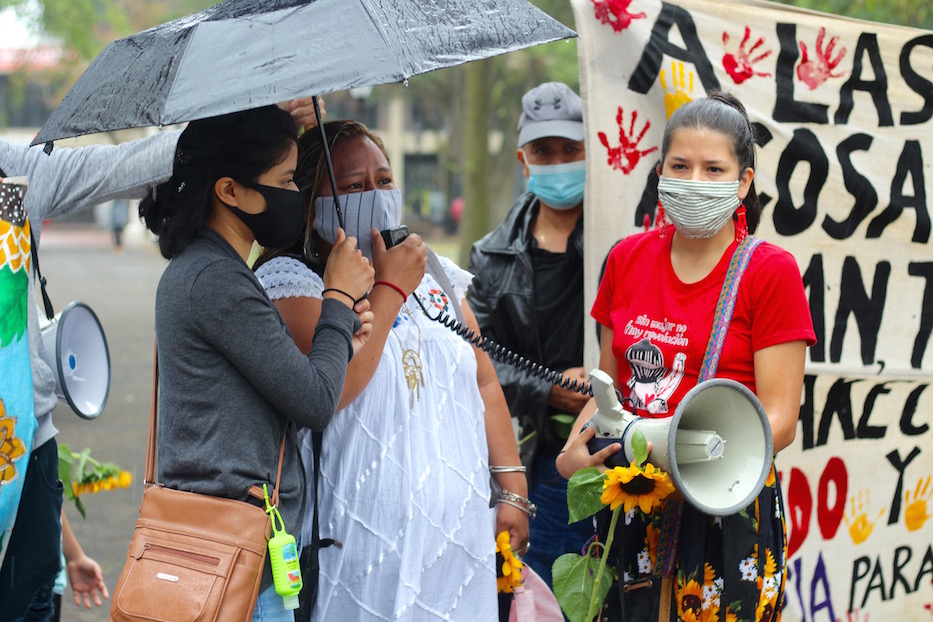
| Fabiola Mendieta-Cuapio (at center): "She was full of life." |
Before heading to Fair Haven, East Haven, and Branford, Suarez called for justice for women across the state, including those facing sex trafficking, domestic violence, and the threat of kidnapping in their homes and from their partners. She noted that the COVID-19 pandemic can be especially unsafe for women and children that are victims of domestic violence, because they are suddenly trapped in their homes.
She pointed to the fact that survivors of domestic violence, trauma, partner abuse and sexual assault, particularly women of color, are less likely to go to the police because they may be retraumatized or not believed in the process. That’s even truer, she said, for undocumented Americans who may fear deportation or retaliation from law enforcement. She recalled the lack of assistance she received while fighting her own assault case in court for four years, in which she leaned not on law enforcement, but on the women in her community.
"Especially if you are a woman, whether you are Black, Hispanic, white, or of any other race and ethnicity, this system fails us,” she said. “It does not seek justice for us. It leaves us behind. In this country and throughout this world, it is the same oppressive, patriarchal system."
“I am here for Lizzbeth, and I'm here for Yane, and I'm here for all of my sisters,” she later added. “Because we need this violence to end. It hurts each of us. You need to understand that. When you take one of our sisters, you are taking a piece of our soul. You are taking from each of us.”
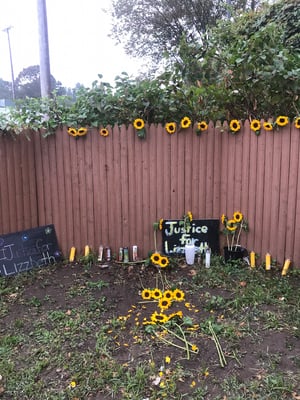
Justice For Lizzbeth is on Facebook. The final photo is from Vanesa Suarez; it shows candles and sunflowers laid where Alemán-Popoca's body was discovered in Branford last month.

